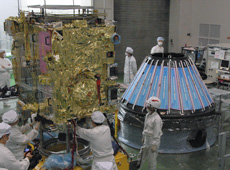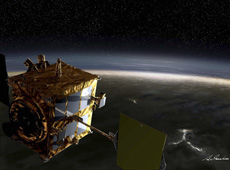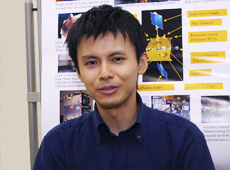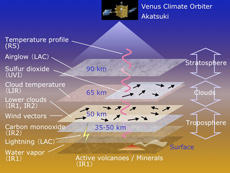Q. How do you think the AKATSUKI mission will advance future planetary missions?

Compatibility test for AKATSUKI (left) and joint section of rocket (right)
I hope that AKATSUKI will become a catalyst for the recognition of planetary meteorology and environmental science as core themes of solar-system exploration. Planetary meteorology studies the conditions that set up planetary atmospheric environments - such as temperature, pressure, and distribution of wind and water - and how these change over time. When you realize that planetary environments are sustained on a very delicate balance, your view of Earth's environment changes accordingly. Japan is one of the leading countries in the field of terrestrial meteorology. With that background, I believe that we can lead the research of planetary meteorology as well.
Q. What is the significance of planetary exploration in the solar system to you personally?
Most importantly, in my opinion, you learn how to look at Earth in relation to other planets. By comparing the planets, you begin to see what makes Earth unique and what makes it ordinary. You start understanding the requirements for the birth of a planet that will have a warm and wet climate and sustain liquid water on the surface, like Earth, by comparing it to Venus or Mars, which did not develop that way.
Another benefit is that it gives you hints for speculating on what the Earth was like in different periods of its history. For example, the primitive Earth soon after birth may have been covered with a much thicker atmosphere than now, looking more like Venus today. Or, through Venus, we might be seeing what the Earth will be like when the Sun swells up at the end of its life. It is also becoming evident that Earth's entire surface froze hundreds of millions of years ago. The climate back then may have been similar to that of Mars today.
Q. Were you always interested in space as a child?

AKATSUKI overlooking the sea of clouds at Venus (illustration by Akihiro Ikeshita)
Yes, although I had other interests, too. But I was always fond of wind. I used to like drawing a weather map while listening to the weather report on the radio, and it still makes me happy when I feel a strong wind. So when I heard about the mysterious wind on Venus, my mind was instantly drawn to that great mystery. In that sense, AKATSUKI is likely an extension of my interest from childhood.
Q. Could you tell us about your dream?
My biggest dream for now is to ensure the success of the AKATSUKI mission. I have only vague ideas after that, but, as there is still so much left to study about Venus, my ambition is endless. For example, there is an idea to launch a balloon into the atmosphere of Venus and observe the planet as the balloon flies in the wind. Mars is also attractive to study. Recent studies have revealed that there is a significant amount of water existing as ice under the soil. I would love to investigate the ice by using a meteorological satellite to observe water vapor, which circulates between the atmosphere and the surface. I would like to know how the ice ended up under the soil, and about climate change on Mars.
Q. Could you give our readers a message for the launch of AKATSUKI?

I hope that AKATSUKI will make many of you interested in space and other planets. Many people were inspired by the vivid images of the Moon taken by the lunar explorer KAGUYA. But unlike the still surface of the Moon, the atmosphere of Venus is constantly moving, as if it were alive. I think that people will be amazed by AKATSUKI's images in a different way than they were by KAGUYA's. I hope that those who have become interested in such images will start wondering why Venus and Earth are so different.
The AKATSUKI mission is such a big event. I would like to involve not only scientists but also people who have not had much of an interest in space before. To make this happen, we are running a campaign to collect messages from the public to send onboard AKATSUKI. We are getting a good response, and are receiving a great volume of messages. I am very much looking forward to the day when we all can share the excitement of AKATSUKI's safe arrival at Venus, and of its images of the planet's swirling atmosphere.
Associate Professor, Institute of Space and Astronautical Science, JAXA
Dr. Imamura received his Ph.D. in 1998 from the Department of Earth and Planetary Physics at the University of Tokyo. He has been involved in the Mars orbiter NOZOMI and the lunar explorer KAGUYA missions. He specializes in planetary atmospheric science.
| Related Link: | Venus Climate Orbiter AKATSUKI Establishment of Planetary Meteorology with Venus Exploration |
Japan and Europe Explore the Mysterious World of Mercury
Space Yacht: using sunlight to cruise through space
